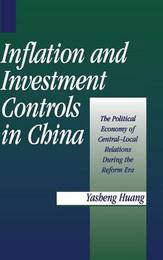
|
Inflation and Investment Controls in China: The Political Economy of Central-Local Relations during the Reform Era
Hardback
Main Details
| Title |
Inflation and Investment Controls in China: The Political Economy of Central-Local Relations during the Reform Era
|
| Authors and Contributors |
By (author) Yasheng Huang
|
| Physical Properties |
| Format:Hardback | | Pages:394 | | Dimensions(mm): Height 229,Width 152 |
|
| Category/Genre | Political economy |
|---|
| ISBN/Barcode |
9780521554831
|
| Classifications | Dewey:332.4150951 |
|---|
| Audience | | Professional & Vocational | | Tertiary Education (US: College) | |
|---|
| Illustrations |
41 Tables, unspecified; 12 Line drawings, unspecified
|
|
Publishing Details |
| Publisher |
Cambridge University Press
|
| Imprint |
Cambridge University Press
|
| Publication Date |
28 June 1996 |
| Publication Country |
United Kingdom
|
Description
How has the Chinese central government been able to avoid the crippling hyperinflation that has bedeviled so many developing and centrally planned economies? China's unique, de facto federalism, Huang argues - a combination of economic and fiscal decentralization and strong political centralization - has spurred economic growth and allowed political institutions to impose restraints on inflation from the top down. Focusing on central-local relations and the controlling role of political institutions, Yasheng Huang explains why local Chinese officials comply, even against their own economic interests, with the investment-reduction and inflation-control policies of the central government. Drawing upon institutional economics, he hypothesizes that the central government's powerful role in appointing and firing bureaucrats at the local level helps to reconcile some of the central-local economic policy differences. Huang uses systematic data analysis to test this proposition. This book also offers detailed descriptions of the roles of local governments in economic and investment management.
ReviewsThis new book by Yasheng Huang is, in my view, one of the most significant studies to have appeared in many years and among other services it underlines, once again, that much of the most illuminating work on the East Asian economies is being done not by economists, but by political scientists, sociologists, historians, and others.' Christopher Howe, The Journal of Development Studies 'Using rigorous quantitative analysis, Professor Huang demonstrates that China's central authorities have not lost their capacity to select and control local government and party officials. This study not only refutes much of the conventional wisdom about Chinese politics during the reform period, it sets a high standard of scholarship in doing so. The book is a model for how this kind of analysis should be carried out.' Dwight Perkins, Harvard Institute for International Development 'Yasheng Huang's book enormously advances three crucial literatures in comparative political economy: on inflationary investment in decentralizing planned economies; on precedence and pacing of economic and political reform, in Communist and in non-Communist authoritarian systems; and on 'federalism' (in Weingast's broad sense) and economic growth in general. With this impressive work, Huang solidly establishes his credentials as the best of the younger scholars of late Communist and post-Communist regimes.' Ronals Rogowski, University of California, Los Angeles 'Must reading. The book uses quantitative and qualitative data to demonstrate convincingly the continued strength of Beijing. It establishes Huang as an outstanding, rigorous, and independent analyst of China's political economy.' Michel Oksenberg, Senior Fellow, Stanford University 'This is one of the most important - and richest - books to be written on post-Mao China. Professor Huang has taken on a difficult subject, the issue of central-local rrelations, and has produced a sophisticated argument that combines solid documentary research and analysis of the structure of China's political economy with skillful statistical analysis.' Steven M. Goldstein, Smith College 'The origins of inflation, Huang emphasizes, arise from the incentives for over-investment that arise at the local level and the difficulties faced by the center in monitoring and sanctioning profligate local behaviour. It is a book that will command a readership among both Chinese specialists and those interested in political economy.' Robert H. Bates, Harvard University
|